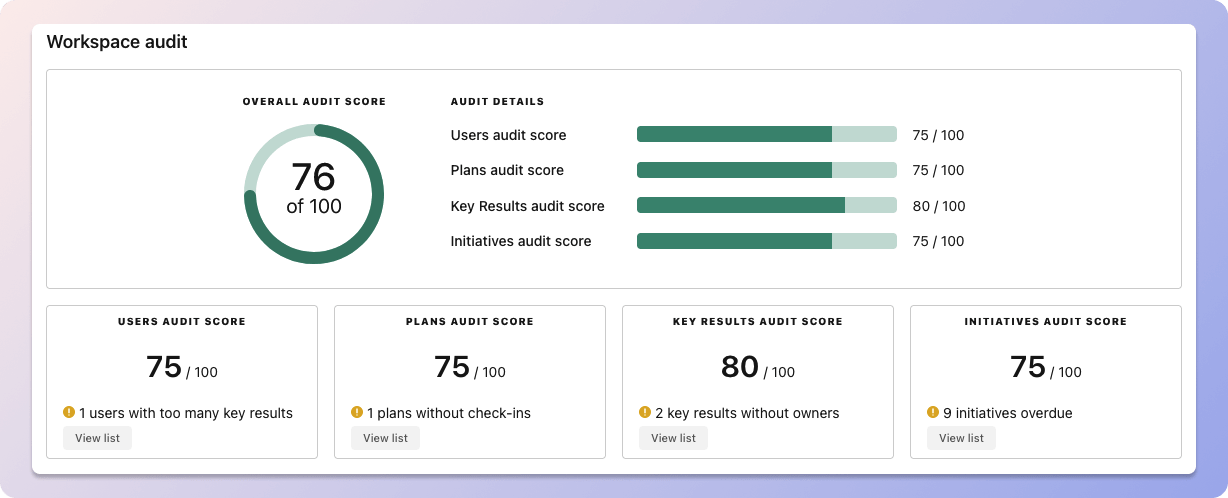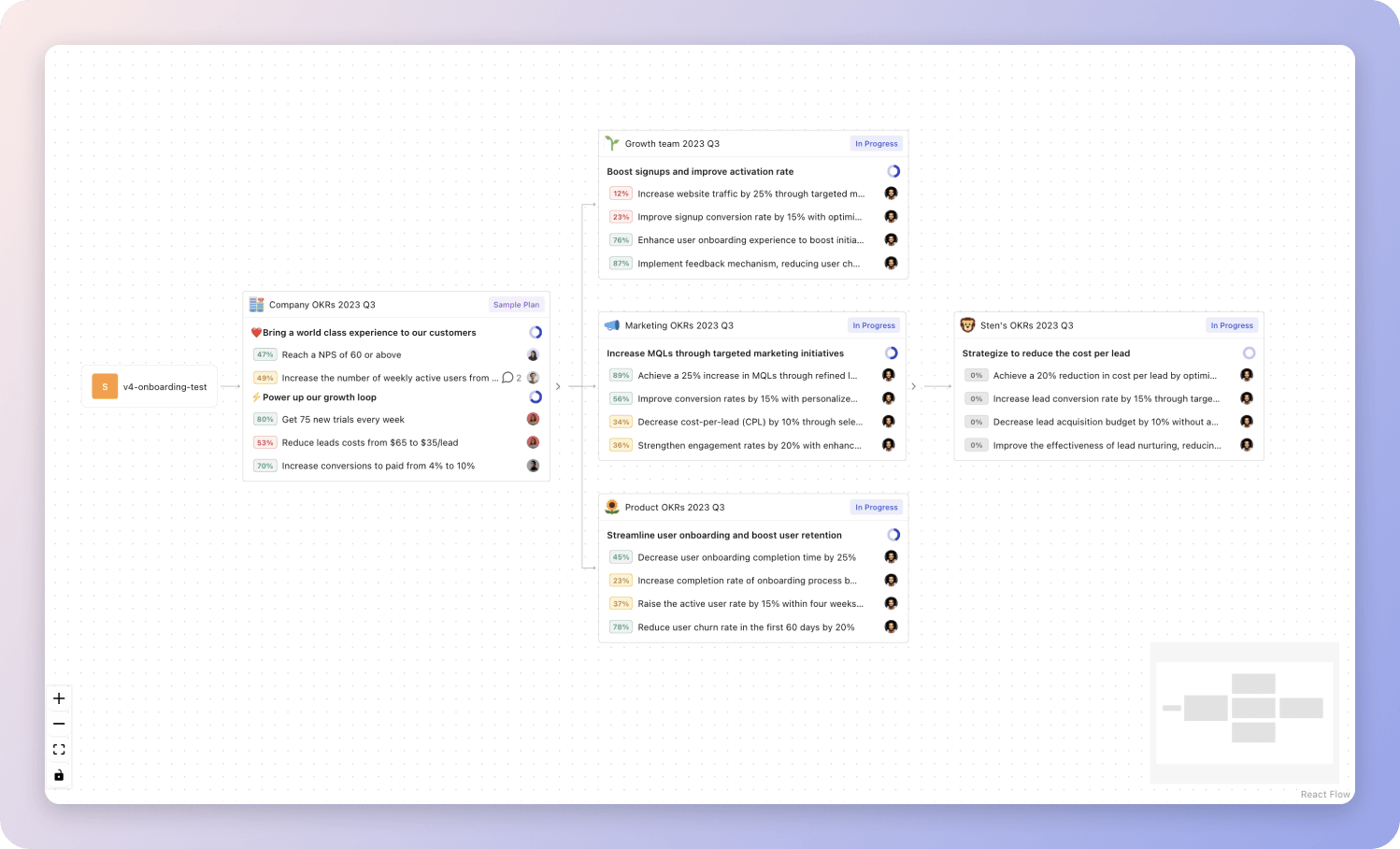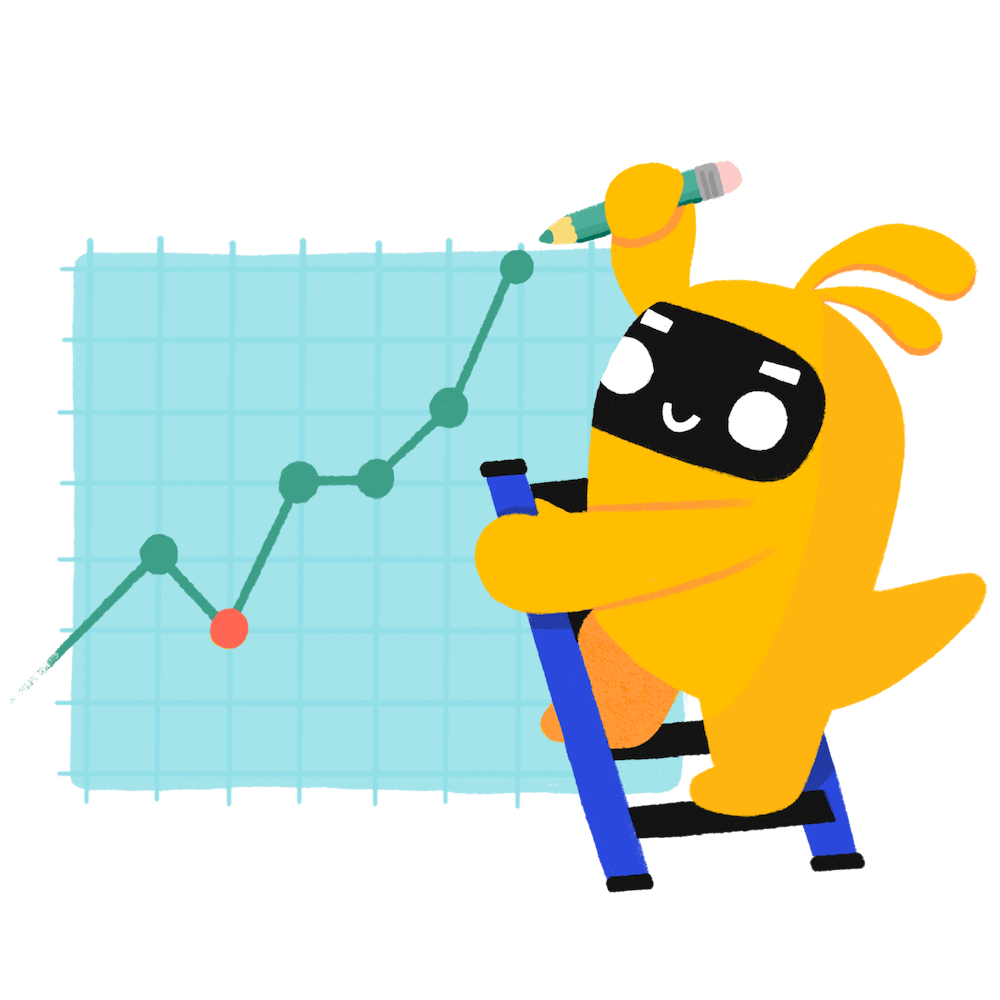5 customisable OKR examples for Talent Development Team
What are Talent Development Team OKRs?
The OKR acronym stands for Objectives and Key Results. It's a goal-setting framework that was introduced at Intel by Andy Grove in the 70s, and it became popular after John Doerr introduced it to Google in the 90s. OKRs helps teams has a shared language to set ambitious goals and track progress towards them.
Crafting effective OKRs can be challenging, particularly for beginners. Emphasizing outcomes rather than projects should be the core of your planning.
We have a collection of OKRs examples for Talent Development Team to give you some inspiration. You can use any of the templates below as a starting point for your OKRs.
If you want to learn more about the framework, you can read our OKR guide online.
Building your own Talent Development Team OKRs with AI
While we have some examples available, it's likely that you'll have specific scenarios that aren't covered here. You can use our free AI generator below or our more complete goal-setting system to generate your own OKRs.
Feel free to explore our tools:
- Use our free OKR generator
- Use Tability, a complete platform to set and track OKRs and initiatives, including a GPT-4 powered goal generator
Our customisable Talent Development Team OKRs examples
You'll find below a list of Objectives and Key Results templates for Talent Development Team. We also included strategic projects for each template to make it easier to understand the difference between key results and projects.
Hope you'll find this helpful!
1. OKRs to enhance personal communication proficiency
Enhance personal communication proficiency
Read 3 books on interpersonal communication and conversation techniques
Purchase or borrow selected books
Research and select 3 books on interpersonal communication
Schedule regular reading sessions to complete all books
Practice active listening in 20 different conversations to gain feedback
Seek constructive feedback post conversation to improve listening skills
Focus on comprehending and responding thoughtfully during these conversations
Initiate 20 varied conversations geared towards active listening
Attend 2 advancing communication workshops remotely
Schedule time to attend the workshops remotely
Research and select 2 online communication workshops
Register for the chosen workshops
2. OKRs to reinforce One Intel team culture and nurture talent effectively
Reinforce One Intel team culture and nurture talent effectively
Facilitate skills enhancement training for 80% of team members
Identify necessary skills for enhancement based on team's job roles
Develop or source relevant training program for identified skills
Schedule and coordinate team members participation in training
Increase employee engagement survey scores by 20%
Initiate periodic career development and training programs
Implement regular team-building activities and exercises
Encourage open communication and welcome feedback
Reduce employee turnover rate by 10%
3. OKRs to implement an efficient vendor invoice tracker
Implement an efficient vendor invoice tracker
Validate the prototype with at least 3 different members of the talent acquisition team
Schedule feedback sessions with each member
Identify three team members for prototype validation
Share the prototype with selected team members
Design a comprehensive prototype of the invoice tracker within 4 weeks
Draft preliminary design and functionality notes for invoice tracker
Develop and refine prototype based on initial design plans
Conduct thorough tests and improve upon the prototype
Ensure 90% of vendor invoices are processed through the tracker by project end
Monitor tracking system regularly to assess progress
Train staff on proper invoice tracking procedures
Implement invoice tracking system for vendor billings
4. OKRs to scale the team by hiring and onboarding key talent to support business expansion
Expand the business by scaling the team with quality personnel
Hire and onboard 3 experienced sales executives
Enhance team diversity by 20% via targeted recruitment strategy
Reduce time-to-fill open positions by 50% through process improvement
Recruit and integrate 2 seasoned marketing specialists
5. OKRs to enhance talent retention strategies
Enhance talent retention strategies
Implement training programs to improve skills of at least 75% of the employees
Implement and monitor said training programs
Develop appropriate training programs in those areas
Identify areas of skill deficiency among employees
Increase employee engagement scores by 15% through enhanced communication strategies
Introduce an open-door policy for improved cross-level communication
Conduct regular, structured feedback sessions to address employee concerns
Implement weekly team meetings to discuss objectives and progress
Reduce staff turnover by 10% by implementing a comprehensive employee satisfaction program
Implement feedback from satisfaction surveys
Develop an employee satisfaction program
Conduct regular employee satisfaction surveys
Talent Development Team OKR best practices to boost success
Generally speaking, your objectives should be ambitious yet achievable, and your key results should be measurable and time-bound (using the SMART framework can be helpful). It is also recommended to list strategic initiatives under your key results, as it'll help you avoid the common mistake of listing projects in your KRs.
Here are a couple of best practices extracted from our OKR implementation guide 👇
Tip #1: Limit the number of key results
The #1 role of OKRs is to help you and your team focus on what really matters. Business-as-usual activities will still be happening, but you do not need to track your entire roadmap in the OKRs.
We recommend having 3-4 objectives, and 3-4 key results per objective. A platform like Tability can run audits on your data to help you identify the plans that have too many goals.
 Tability's audit dashboard will highlight opportunities to improve OKRs
Tability's audit dashboard will highlight opportunities to improve OKRsTip #2: Commit to weekly OKR check-ins
Don't fall into the set-and-forget trap. It is important to adopt a weekly check-in process to get the full value of your OKRs and make your strategy agile – otherwise this is nothing more than a reporting exercise.
Being able to see trends for your key results will also keep yourself honest.
 Tability's check-ins will save you hours and increase transparency
Tability's check-ins will save you hours and increase transparencyTip #3: No more than 2 yellow statuses in a row
Yes, this is another tip for goal-tracking instead of goal-setting (but you'll get plenty of OKR examples above). But, once you have your goals defined, it will be your ability to keep the right sense of urgency that will make the difference.
As a rule of thumb, it's best to avoid having more than 2 yellow/at risk statuses in a row.
Make a call on the 3rd update. You should be either back on track, or off track. This sounds harsh but it's the best way to signal risks early enough to fix things.
How to turn your Talent Development Team OKRs in a strategy map
OKRs without regular progress updates are just KPIs. You'll need to update progress on your OKRs every week to get the full benefits from the framework. Reviewing progress periodically has several advantages:
- It brings the goals back to the top of the mind
- It will highlight poorly set OKRs
- It will surface execution risks
- It improves transparency and accountability
Spreadsheets are enough to get started. Then, once you need to scale you can use a proper OKR platform to make things easier.
 Tability's Strategy Map makes it easy to see all your org's OKRs
Tability's Strategy Map makes it easy to see all your org's OKRsIf you're not yet set on a tool, you can check out the 5 best OKR tracking templates guide to find the best way to monitor progress during the quarter.
More Talent Development Team OKR templates
We have more templates to help you draft your team goals and OKRs.
OKRs to increase revenue stream for the newspaper's Editorial department
OKRs to enhance efficiency in production and testing processes
OKRs to enhance team collaboration and knowledge sharing
OKRs to achieve MongoDB certification
OKRs to enhance the efficiency and effectiveness of administrative support
OKRs to successfully launch challenge MVP (Minimum Viable Product)
OKRs resources
Here are a list of resources to help you adopt the Objectives and Key Results framework.
- To learn: What is the meaning of OKRs
- Blog posts: ODT Blog
- Success metrics: KPIs examples
Create more examples in our app
You can use Tability to create OKRs with AI – and keep yourself accountable 👀
Tability is a unique goal-tracking platform built to save hours at work and help teams stay on top of their goals.
 1 Create your workspace
1 Create your workspace 2 Build plans in seconds with AI
2 Build plans in seconds with AI 3Track your progress
3Track your progress